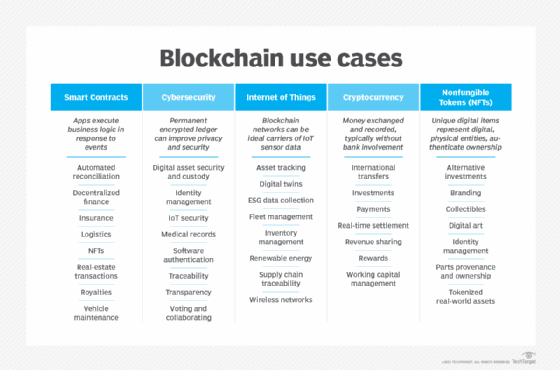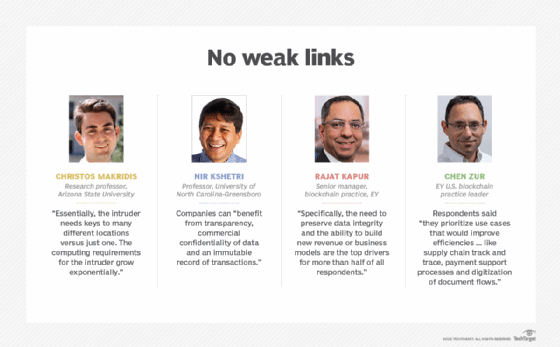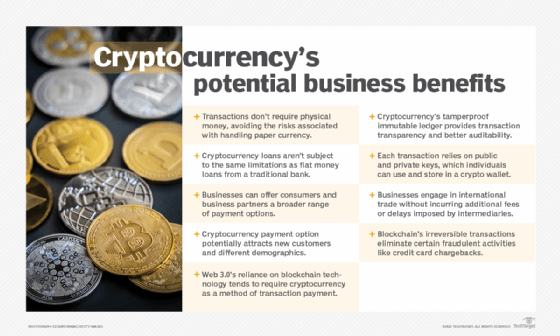Today's blockchain use cases and industry applications
Though not yet a mature technology, blockchain is gaining ground as a sound and generally secure method for conducting myriad transactions in numerous applications and industries.
Blockchain is a type of decentralized database technology designed to provide a secure and unchangeable record of transactions. Groups of transactions comprise a block, the contents of which, in theory, can never be changed. Each block is timestamped and joined to the filled block before it with another block joined behind it when data is added to it, forming what is known as a blockchain. It is one type of distributed ledger wherein all participants agree on each transaction's "truth" and verify the legitimacy of the transaction before it becomes a permanent record in a block.
Blockchain came into prominence with the advent of cryptocurrencies like Bitcoin, a peer-to-peer electronic money system. But now "blockchain has a branding issue," said Martha Bennett, an analyst at Forrester Research. The branding issue rose from blockchain's close association with cryptocurrencies and nonfungible tokens (NFTs).
However, modern blockchain use cases and industry applications have expanded far beyond crypto and NFTs.
"The best use cases, at least for now, are actually not general but instead are specific to a company, industry or function," said Jitin Agarwal, president of Workspend, a managed service provider for contingent workers. He advised organizations to dig deep into their operations to understand which of the key blockchain-related benefits -- transparency, governance, security, public access, immutability and auditing capability -- is most valuable.
Top blockchain use cases
Blockchain is a general-purpose technology, which means it is applicable across sectors, said Christos Makridis, a research professor at Arizona State University and a digital fellow at the MIT Initiative on the Digital Economy. "For example, financial services can use it to write smart contracts between consumers and their banking institution. Similarly, healthcare can use it to write smart contracts between insurers and hospitals as well as between patients and hospitals. The possibilities are endless."
Blockchain use cases continue to expand. Here are some common commercial applications:
Smart contracts
The primary function of these programs is to automate the execution of contract terms when certain conditions are met. The software code follows relatively simple logic to ensure that all parties receive the benefits or penalties stipulated in the contract. The blockchain makes a permanent record of every action related to the transaction.
Cybersecurity
Blockchains have long been hyped as being highly secure because of their permanency, transparency and distributed nature. There's no central entity to attack and no centralized database to breach, which makes it challenging for criminals to break in. "Essentially, the intruder needs keys to many different locations versus just one," Makridis noted. "The computing requirements for the intruder grow exponentially."
However, smart contract vulnerabilities and widely publicized security breaches are smashing the assumption that blockchains are secure. In 2022, the Solana and Ethereum blockchain platforms lost $320 million in a hack of Wormhole, a bridge between the two platforms. DODO DEX, a decentralized finance protocol, lost $3.8 million in cryptocurrency in a smart contract hack the same year. Blockchains as a whole pose security risks as well. Sybil attacks, in which a hacker adds bogus participants to the network, are a top issue. Others include 51% attacks and phishing attacks.
IoT
Asset tracking and inventory management that employ IoT are two common blockchain uses in supply chains. A third use is IoT devices that record measurements captured by sensors in the Arctic, the Amazon jungle, in a manufacturing plant or on a NASA drone surveying Mars.
"Whether it be reports of chemical data regarding oil grades or tracking shipments of electronics across the world through various ports of entry, the blockchain can be utilized anywhere there is data interacting with the real world," explained Aaron Rafferty, founder of cryptocurrency investment firm R.F. Capital and co-founder of Standard DAO, a community-owned, decentralized treasury that runs on blockchain.
Cryptocurrency
The blockchain concept was originally developed to manage cryptocurrencies such as bitcoin. Given the anonymity of crypto coins, blockchain is an effective way to document transactions accurately and provide privacy for the parties involved. However, in what has come to be known as the crypto winter of 2022, cryptocurrency was plagued by fraud accusations, bankruptcies and a sharp drop in valuation, which have led to calls for government regulation.
NFTs
A type of digital or virtual asset, NFTs are units of data certified to be unique and not interchangeable. According to Rafferty, NFTs are revolutionizing the digital art and collectibles world. "We are using decentralization and the Ethereum blockchain to create a music livestream network where artists and streamers can connect with fans directly, sell their NFTs, receive contributions from fans and trade in their rewards and contributions for crypto tokens," said Shantal Anderson, founder and CEO of music and pop culture streaming network Reel Mood.
But like cryptocurrencies, NFTs have hit significant snags in their real and perceived value. For example, while China has not yet banned NFTs like it has cryptocurrencies, it has issued a warning that NFTs "have crypto-like attributes," signaling that a ban might be possible in the future.

Real-world industry blockchain applications
Most industries can use blockchain, Agarwal said, but the applications that "offer the most 'bang for your buck' are based on optimizing and reducing the friction associated with engaging in normal business practices."
Running a business more efficiently is just one part of the benefits that can be gained from blockchain applications. "Specifically, the need to preserve data integrity and the ability to build new revenue or business models are the top drivers for more than half of all respondents," said Rajat Kapur, senior manager in the blockchain practice at EY.
Here are some notable applications of blockchain in the public and private sectors, including government; healthcare; supply chains; media; and financial institutions, including banking services.
Healthcare
The possibilities for blockchain use in healthcare seem endless. "There are a number of potential use cases: managing electronic medical record data, protecting healthcare data, safeguarding genomics information, and tracking disease and outbreaks, to name some," said David Brown, science and program director at Qatar Precision Medicine Institute.
Precision medicine is medicine matched to a patient's genomics to improve results and minimize or eliminate side effects. It also encompasses genomic-based medicines that are badly needed as infectious agents become increasingly resistant to antibiotics.
"Blockchain," Brown explained, "allows healthcare providers and researchers to develop groundbreaking drugs and therapies based on genomic profiles."
Government
There are many blockchain use cases in government agencies, including voting applications and personal identification security.
Because blockchains can't usually be forged or their data manipulated, they can hold digital IDs, certificates of any kind and even passports, Rafferty said. "This data can be accessed and viewed at any time in a completely transparent manner, which will bolster international travel industries."
Similarly, voting in a truly decentralized, transparent and secure manner on a blockchain helps eliminate the middleman and questions concerning vote manipulation or fraud.
Financial services
Blockchain is used in many types of financial applications. Trade finance, for example, "is riddled with multiple steps and concurrent processes that can dramatically elongate transaction timelines," Agarwal said. With blockchain, the entire process is simplified with a bidirectional data flow that streamlines the trade finance transaction for each participant and "dramatically reduces the time to close from 10 to 12 weeks to approximately one week."

Banking
Chen Zur, EY's blockchain practice leader, said he expects business-to-business enterprise clients that have contractually driven, multiparty cash flow distributions to use blockchain to automate contract-related calculations and processing.
Though it is still considered to be far from a mature technology, Kapur said blockchain is already used in many real-world banking applications, "including contract management, real-time transparency, calculations and reporting, inventory management, procurement, funds traceability, lending and borrowing, digitizing assets, cryptocurrencies, reconciliation and settlements [for securities and commodity trades], and secure land registries."
Supply chain management
Supply chains were already the hottest blockchain application before the COVID-19 pandemic disrupted supply chains worldwide.
Blockchain is a good fit because complex global supply chains have no central authority and lack visibility, said Nir Kshetri, a professor at the University of North Carolina-Greensboro and a research fellow at Kobe University.
Companies involved in a supply chain can benefit from transparency, commercial confidentiality of data and an immutable record of transactions, Kshetri added. "For these reasons, the Netherlands-based market intelligence platform Blockdata's analysis found that traceability and provenance supply chains were the most popular blockchain use case among the world's biggest brands in 2020."
Media and entertainment
The media and entertainment industry is a rich arena for blockchain use, and the applications are as imaginative as the industry itself.
"A company can mint tickets to a football game or concert to a major artist tour on-chain and set parameters so that, every time the ticket is resold on the second-hand market, the team or artist collects royalties on those transactions set at a percentage that they determine during the minting process," Rafferty said.
Another example of a successful use case is EY and Microsoft's blockchain-based product for gaming rights and royalties management, which Zur said provides a financial system of record from contract creation to payment reconciliation. Microsoft was planning to use the expanded blockchain functions to "enable its Xbox gaming partners and its network of artists, musicians, writers and other content creators to gain increased visibility into tracking, management and payment processing for royalty contracts."
Anderson said her company, Reel Mood, uses a proprietary decentralized video server that runs on the Ethereum blockchain "to give us high-quality resolution for users, competitive rates, and little disruption or lag."
Living Opera is conducting R&D into blockchain applications to match opera songs with visual art to enhance the overall use experience, Makridis noted. "Moreover, because smart contracts are simply lines of code, we are also exploring ways of embedding an interactive component into the art."

Time is ripe for blockchain
Today, companies are zeroing in on how to use blockchains to generate new revenue streams and create rather than suffer from disruption.
The best blockchain use cases are the ones that let companies create or take advantage of the inherent Metcalfe effect of blockchain but do so "without the need or requirement to move substantial chunks of their market with them," Agarwal said. "This creates a more manageable shift that the company can control -- an opportunity to be an early adopter driving disruption, rather than being disrupted."








